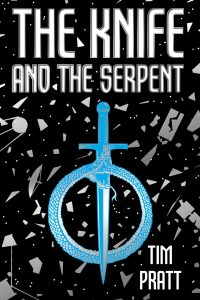Liz Bourke Reviews These Burning Stars by Bethany Jacobs
 These Burning Stars, Bethany Jacobs (Orbit US 978-0-316-46332-4, $19.99, 423pp, tp) October 2023.
These Burning Stars, Bethany Jacobs (Orbit US 978-0-316-46332-4, $19.99, 423pp, tp) October 2023.
These Burning Stars is Bethany Jacobs’s debut novel, and it’s an interesting and ambitious space opera – and a surprisingly self-contained narrative for an entry in that typically sprawling subgenre. Jacobs has the confidence to go big, and the control to bring her debut to a satisfying conclusion: I feel that fans of Megan E. O’Keefe’s work, Elizabeth Bear’s Machine, or Ann Leckie’s oeuvre may find much to entertain themselves here.
The worlds of These Burning Stars are partly ruled by powerful aristocratic families, and partly by a religious organisation. I’m not sure whether the term ‘‘the Kindom’’ refers primarily to this religious organisation or, like ‘‘Christendom’’ once did, to the societies where adherence to the religion is essentially a requirement for any kind of power, but it seems to me to encompass both. The power of the religious organisation brings to mind the Catholic Church at the height of its secular and spiritual influence, but Jacobs’s imagination avoids direct borrowing. The Kindom as a religious hierarchy divides itself into three ‘‘kins’’: cloaksaan, secretaries, and clerics. Or to be more precise: warrior-assassins and enforcers; bureaucrats, functionaries, and judicial staff who administer the organisation and its holdings and uphold matters of law; and the priestly pastoral and spiritual care arm. The boundaries between them seem more rigid in theory than in practice.
Esek Nightfoot is a member of one of these powerful aristocratic families and a Hand of the Kindom, an influential senior cleric. She is technically a priest. Her behaviour is more that of an enforcer, and the novices who apprentice with her universally – with one exception – become cloaksaan. Charismatic, brutal, and clever, Esek is fiercely ambitious, loyal to her family over the priesthood (because her family better serves her ambitions), possessive, and disinclined to either empathy or sympathy. The novel opens with her diverting an exceptionally talented young student’s career – ruining it – and challenging them to impress her for no better reason than that she can.
That student, known only as Six, is a descendant of a man reviled for committing genocide against the Jeveni, a people who have always been marginalised and now largely live either in small, legally restricted communities or as clients of Esek’s family, working in the factories that make the artificial mineral that powers spaceflight – a replacement for the mineral once mined from the Jeveni’s home moon. Esek’s treatment of Six leads to a yearslong game of cat and mouse where Six threatens the dominance and reputation of Esek’s family, and Esek tries (and fails) to destroy Six.
Jun Ironway is another person whose life was ruined by Esek. Esek would have killed her entire family, instead of just some of them, if a mysterious benefactor hadn’t spirited them away into hiding. Instead of the career she thought she’d have, she’s a con woman and a hacker, talented at evading electronic security. Now she’s finally about to get her hands on a recording that might embarrass the Nightfoot family. Unbeknownst to her, it actually contains the kind of information that, rather than merely embarrassing the Nightfoots, could bring them down entirely and destabilise the entire Kindom. That’s if she can get past the encryption that’s on it and live long enough to decide whether her revenge is worth causing that much chaos.
Living long enough might be a problem. Esek is on her trail.
Chono is a cleric. Good at her role, beloved by her parishioners, conflicted in her emotions: She was Six’s classmate and then Esek’s novice, and has been part of Six and Esek’s cat-and-mouse game of obsession and revenge for a very long time. Her connections to Six and to Esek are fraught: violence, loyalty, gratitude, and affection all tangle together. Now the leader of her religion no longer trusts Esek to honour her vows as a cleric, as she could instead inherit the leadership of her family, and with it control of the artificial mineral that fuels spaceflight. Esek is being sent to retrieve the same recording that Jun is after as a test of her loyalties, and Chono is being assigned to accompany her: to assist her, to moderate her more vicious impulses, to report on her actions and intentions.
The consequences of chains of events set in motion years ago are finally coming home to roost, all tied up with the fate of the Jeveni, past and present. In the bloody tangle of revenge, retribution, and responsibility, both Jun and Chono are faced with difficult choices, or perhaps difficult realisations, about their priorities. And as for Six and Esek? Their mutually destructive obsession finds an unexpectedly apt fulfilment.
These Burning Stars has the tension of an action thriller and a willingness to jump backward and forward across the timeline of its narrative to play more deftly with tension and revelation than a linear narrative would allow. It’s vigorously bloody, uncomfortably plausible in its politics, and has a compelling voice and characters. It’s also both casually and interestingly queer, though I’m not convinced that its visible thematic interest in the blurred boundaries of identity and affiliation is all that coherently developed. (One revelation of identity comes quite late, and as a relatively unsignposted surprise to the reader.) But this matters little in its overall success as a fast-moving novel of action and intrigue, which Jacobs pulls off with vivid energy, bringing her threads together in an explosive conclusion.
Props for the memorable nonviewpoint character of Liis Konye, a former cloaksaan, Jun’s lover, who steals every scene she’s in. (Fierce, competent, with a prosthetic arm and such hinted-at backstory: definitely made an impression.)
I’ll be looking forward to what Jacobs does next, because I thoroughly enjoyed These Burning Stars. It’s got verve.
Liz Bourke is a cranky queer person who reads books. She holds a Ph.D in Classics from Trinity College, Dublin. Her first book, Sleeping With Monsters, a collection of reviews and criticism, is out now from Aqueduct Press. Find her at her blog, her Patreon, or Twitter. She supports the work of the Irish Refugee Council and the Abortion Rights Campaign.
This review and more like it in the December and January 2023 issue of Locus.
 While you are here, please take a moment to support Locus with a one-time or recurring donation. We rely on reader donations to keep the magazine and site going, and would like to keep the site paywall free, but WE NEED YOUR FINANCIAL SUPPORT to continue quality coverage of the science fiction and fantasy field.
While you are here, please take a moment to support Locus with a one-time or recurring donation. We rely on reader donations to keep the magazine and site going, and would like to keep the site paywall free, but WE NEED YOUR FINANCIAL SUPPORT to continue quality coverage of the science fiction and fantasy field.
©Locus Magazine. Copyrighted material may not be republished without permission of LSFF.







